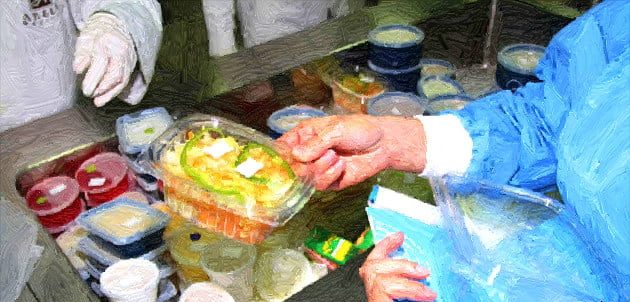Who Ensures Our Food Safety During COVID-19 Pandemic?

Case One: Ordered a vegetable burger, three chicken patties through a food aggregator from Brown and Cream, The Swosti Grand. Burger bread was crumbling and patties were stale. Chicken patties were very flaky, clearly indicating usage of hydrogenated oil which is trans-fat.
Case Two: Ordered Jain Satvik food – four paranthas and simple potato & tomato curry, from Juggad Junction. The paranthas were burnt on one side and to cover up the staleness of the curry, added quite a bit of tomato ketchup.
This is the scenario now with takeaway food service offered by restaurants and delivered by food aggregators in Bhubaneswar. I am sure like me, everyone is facing a similar experience. We have a Food Safety Commissioner along with a functional department, but has the administration taken any proactive role?
We also have BMC, the main watchdog for control of price and other aspects of food like adulteration, deterioration, quality and quantity. As this topic is vast, we consider one aspect at a time.
We will start with Food Safety.
We have been in a pandemic situation since 2020, thanks to COVID-19. Food has been one of the most discussed subjects, and we have not ensured food safety in the supply chain – from restaurant kitchens to plates. Though there has been no concrete evidence of the virus spreading through food, the fact remains that food safety measures should have increased manifold.
With the spread of the virus, the need for food safety and quality check should be a top priority. World Health Organization (WHO) had outlined the retention time of the virus on plastic, paper, wood, metal, fibre etc. Have we taken any measures and ensured the package as per defined norms?
The need of the hour is for strict food safety measures applicable to Food Handlers and Consumers while buying food.
Food Handlers
The food handlers and food business operators (FBOs) are at major risk as they have multiple contact points and also shelf life of the food handled. No directives have come from the governing body and no monitoring has been done — be it at the supply chain, cold chain production, packaging or reselling.
The Responsibilities of FBOs at this stage plays a major role even though they are not guided well by the governing bodies. First, they should have a Food Safety officer and auditor on board. The person should be FOSTAC-trained and certified at Level 2 in Advanced Catering, Advanced Bakery, Manufacturing, Poultry and Meat, Milk and Milk Products and other relevant subjects related to Food Chain. Along with that, he should be a certified food safety auditor as per international standards. This has become mandatory in other countries and it is under the gambit of FSSAI in India, but the local bodies have to monitor strictly.
In the present pandemic situation, the food auditor and local bodies will have to ensure the following:
* Establish a Response team and nominate a COVID-19 coordinator in the FBO unit.
* Monitoring and implementation of personal hygiene for all the members – hand-washing, face mask/cover and clean protective clothing, gloves, respiratory hygiene, reporting of illness, quarantine and isolation, avoidance of biometric/fingerprint attendance, cleaning of premises after every shift and no sharing of personal belongings amongst employees. FSSAI posters and guidelines should be mandatory at the units as required.
* Physical distancing should be maintained amongst employees. Ensuring not more than 3-4 employees in an area of 10 square feet. Designing the cooking workstation accordingly. Have colour-coded lines for operations – Kaizen technique. Ensure that all meetings are done in virtual mode. Pre-booking of takeaway orders. Have a lean menu for fast service, which will avoid piling up inventories.
* Pick-up zones should be in a designated zone. Stress on e-payments, e-wallets, online order and contactless delivery which should be encouraged.
* In retailing outlets: clean uniforms and safety gears are a must for the employees, and the customers’ inflow and outflow should be safely maintained by markings for social and physical distancing. Flexi barriers at checkout and taking appropriate sanitation measures.
* While transporting food and food materials, the most important aspect is the cleaning and sanitizing the vehicles. Records have to be maintained for deliveries, personal hygiene. Vehicles entering containment zones have to be double sanitized as per WHO standards.
* Consumers, while planning to shop, should draw up a list for just a week’s consumption keeping in mind that bulk buying will create unnecessary supply chain disturbance. Carry your own sanitizing kits along with your own shopping bags which can be cleaned and sanitized at home.
The pandemic has grown in leaps and bounds, and it is obligatory for the state machinery to keep a tab on the Food Safety aspect. But I doubt whether the government machinery is monitoring in a systematic way.
(In the next article, the topic of discussion will be Food Quality)

Comments are closed.